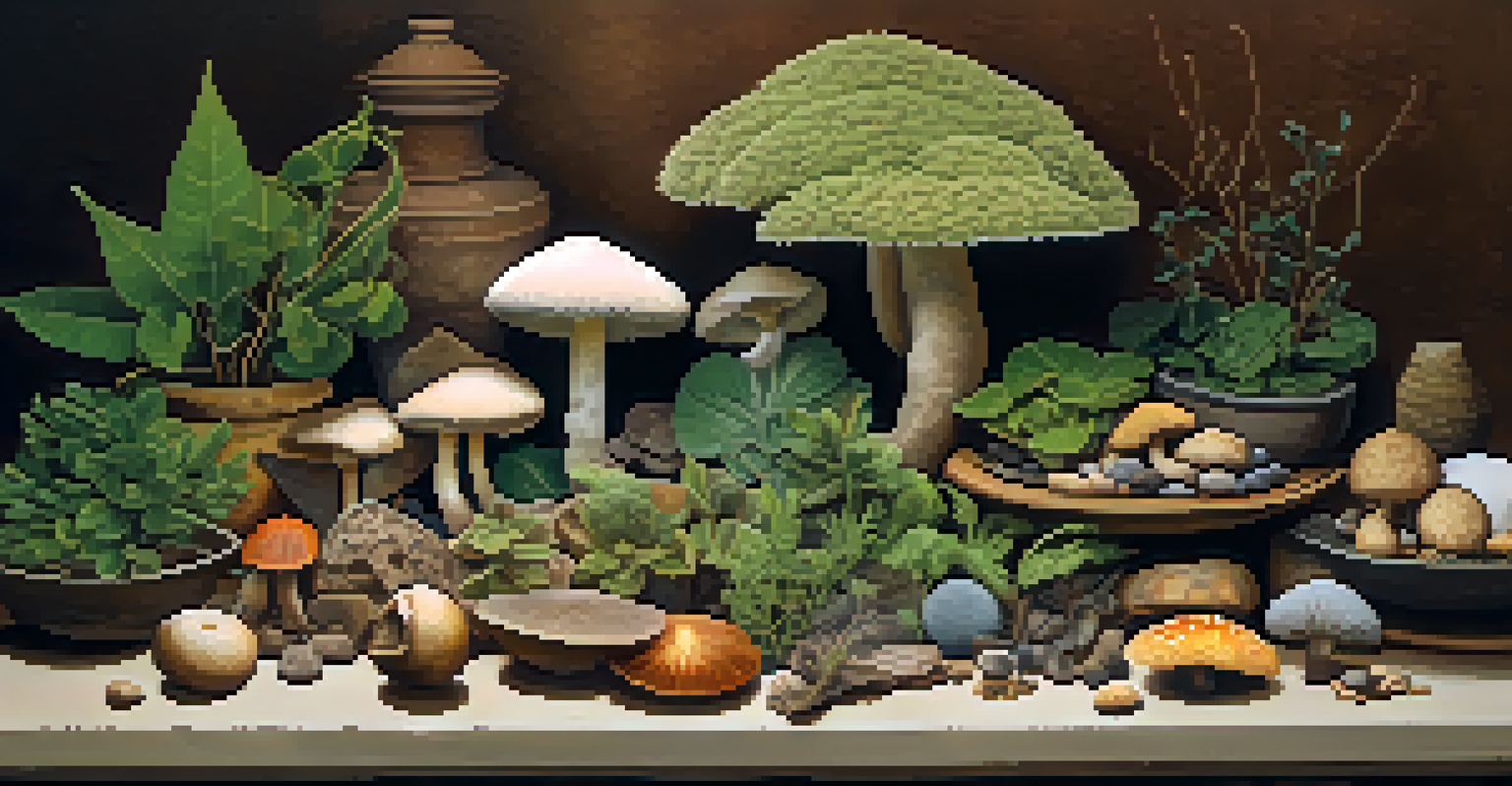Challenges of Ethical Consumption in the Entheogen Market

Understanding Entheogens and Their Appeal
Entheogens are substances that have been used for centuries in various cultures for spiritual and therapeutic purposes. They include plants and fungi like psilocybin mushrooms, peyote, and ayahuasca. The growing interest in these substances has sparked a modern exploration of their benefits, especially in mental health and personal growth.
The greatest danger in times of turbulence is not the turbulence; it is to act with yesterday's logic.
As more people turn to entheogens, there's a rising curiosity about their ethical implications. Individuals often seek authentic experiences, which can lead them to question the origins and sourcing of these substances. This quest for knowledge is essential in fostering responsible consumption.
However, with this appeal comes the challenge of navigating a market that can be murky. Consumers must sift through misinformation and varying quality, making it crucial to understand where these products come from and the impact their consumption has on communities.
The Impact of Sourcing on Communities
One of the most pressing challenges in ethical consumption is the impact of sourcing entheogens on indigenous communities. Many of these substances have deep cultural significance, and their commodification can lead to exploitation. This raises the question: are consumers honoring these traditions or merely exploiting them for personal gain?

When entheogens are harvested from their natural habitats without proper respect or compensation to local communities, it can cause significant harm. Overharvesting can threaten the ecological balance, while ignoring the rights of indigenous people undermines their cultural heritage. Consumers must consider these factors when making choices.
Ethical Sourcing of Entheogens
Consumers must consider the impact of sourcing entheogens on indigenous communities and their cultural heritage.
Ethical consumption means supporting fair trade practices and respecting the knowledge and traditions of those who have used these substances for generations. This not only ensures sustainability but also acknowledges the importance of cultural heritage in the entheogen market.
Quality and Safety Concerns in the Market
The entheogen market is not regulated in the same way as pharmaceuticals, leading to potential quality and safety issues. Consumers may encounter products that are contaminated or misrepresented, which can pose health risks. This variability makes it crucial for buyers to educate themselves about what they are consuming.
Education is the most powerful weapon which you can use to change the world.
Without standardization, it can be challenging to discern the purity and potency of entheogens. This lack of transparency can lead to irresponsible usage and negative experiences. Therefore, consumers are encouraged to seek reputable sources and consider third-party testing as a safeguard.
Ultimately, the responsibility falls on the consumer to ensure they are making informed choices. By prioritizing quality and safety, individuals can engage in a more ethical consumption practice that respects their well-being and the integrity of the substances.
The Role of Education in Ethical Consumption
Education plays a vital role in promoting ethical consumption in the entheogen market. As awareness grows about the benefits and risks associated with these substances, consumers are more likely to make informed choices. Knowledge empowers individuals to seek out ethical sources and engage in responsible practices.
Moreover, education can bridge the gap between traditional knowledge and modern usage. By learning from indigenous practices and understanding the cultural significance of entheogens, consumers can cultivate a deeper respect for these substances. This respect is crucial in fostering a more ethical marketplace.
Quality and Safety in the Market
The unregulated entheogen market poses risks, making it essential for consumers to prioritize quality and seek reputable sources.
Workshops, documentaries, and community discussions can serve as valuable resources for educating consumers. By encouraging dialogue around ethical consumption, we can create a more informed community that values sustainability and cultural heritage.
Navigating Legal and Regulatory Challenges
The legal landscape surrounding entheogens is complex and varies widely across regions. In some places, substances like psilocybin are being decriminalized, while in others, they remain strictly prohibited. This patchwork of regulations can create confusion for consumers seeking to engage ethically.
Navigating these legal challenges requires consumers to stay informed about the laws in their areas. Ignorance of the law can lead to unintended consequences, including legal repercussions for possession or usage. Understanding the legal context is essential for responsible consumption.
Furthermore, advocating for sensible reforms can help shape a more ethical market. By supporting policies that promote safe access and responsible use, consumers can contribute to a future where entheogens are treated with the respect they deserve.
The Importance of Community and Support Networks
Building a supportive community around ethical consumption can enhance individual experiences with entheogens. Sharing knowledge, experiences, and resources fosters a culture of responsibility and respect. This communal approach can also mitigate the risks associated with isolation in personal journeys.
Support networks can provide insights into safe practices, sourcing, and personal growth. They can act as platforms for discussing ethical dilemmas and navigating challenges in the market. Engaging with like-minded individuals creates a sense of accountability, encouraging more responsible consumption.
Education Drives Responsible Choices
Increasing awareness and education about entheogens can empower consumers to make informed and ethical consumption decisions.
Ultimately, a strong community can amplify the positive aspects of entheogen use while addressing potential pitfalls. By fostering these connections, individuals can contribute to a healthier, more ethical consumption culture.
Future Trends in Ethical Consumption of Entheogens
As interest in entheogens continues to grow, the market is evolving. New trends are emerging that prioritize sustainability, ethical sourcing, and community engagement. Consumers are increasingly looking for brands that align with their values, pushing the market toward more responsible practices.
Future innovations may include better tracking of sourcing and greater transparency in production processes. This could involve using technology to trace the journey of an entheogen from its origin to the consumer's hands. Such advancements would empower consumers to make ethical choices more easily.

Moreover, as more research sheds light on the benefits of entheogens, there may be a shift towards integrating these substances into therapeutic settings. This could help solidify ethical consumption practices that prioritize safety, quality, and cultural respect in the years to come.